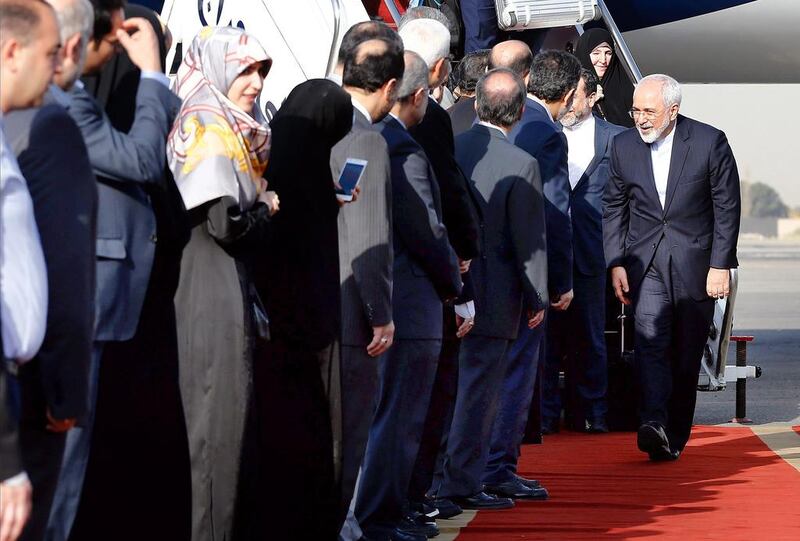NEW YORK // US president Barack Obama began his campaign to defend a historic deal aimed at curbing Iran’s nuclear programme on Wednesday, as many in congress looked set on trying to scuttle it.
But Mr Obama was not the only one facing deeply sceptical critics at home. In Tehran, conservatives who dominate the country’s parliament have already criticised the deal as giving away too much.
In Washington, Republicans – who control both chambers of the US congress – and pro-Israel Democrats have both vowed to kill the agreement during a 60-day review period in which congress has the option to take a vote to legally block Mr Obama’s ability to suspend American sanctions through executive actions.
“[My hope] is that everyone in congress evaluates this agreement based on the facts,” Mr Obama said during a White House press conference on Wednesday. “Not on politics, not on posturing, not on the fact that this is a deal I bring to congress as opposed to a Republican president ... But based on what’s in the national interest of the United States of America.”
He challenged congressional critics to, “present an alternative”, adding that “if the alternative is that we should bring Iran to heel through military force, then those critics should say so, and that will be an honest debate”.
The task for officials in the government of Iranian president Hassan Rouhani will likely be easier, however. The country’s supreme leader, Ayatollah Ali Khamanei, has the final say over foreign policy, and so far he has voiced support for the agreement.
In a tweet on Tuesday, posted after the deal was struck, Mr Khamenei praised the “honest and hard endeavours” of the country’s nuclear negotiating team.
Before the ayatollah gives his official approval, the supreme national security council – which includes Mr Rouhani and the main Iranian negotiator, foreign minister Mohammed Javad Zarif – will first have to endorse the deal, a senior adviser to the supreme leader told Iranian media.
The US president has said he would veto any congressional bill against the deal, and his veto could only be overridden if congress can muster a two-thirds super majority.
To avoid any possible override, the White House is now seeking to secure enough support from Democratic members of congress for the deal. A senior White House official laid out the administration’s argument on Tuesday, saying that sanctions did not prevent Iran from building its nuclear programme or extend the breakout time needed for Tehran to build a weapon.
It will also be difficult for the US to enforce sanctions if it is seen as having killed the deal, the official said. “If there was a decision taken by congress to kill this deal, there is not a scenario that anybody could see whereby the rest of the world would sign up for additional sanctions,” he said.
Many observers in Washington see a congressional vote against the nuclear deal and a subsequent presidential veto as nearly inevitable. Whether enough Democratic support can be mustered to save the veto is the focus of speculation, but the administration’s lobbying campaign is likely to be successful.
“We will have a resolution of disapproval,” Representative Brad Sherman, a California Democrat who opposes the deal, said during a House hearing on the accord on Tuesday. “It’ll pass. It will be vetoed. The veto will be sustained. And we will get the deal in the weakest, most pitiful way possible.”
The detailed terms of the agreement in the 159-page document, known as the “Joint Comprehensive Plan of Action”, will be also be debated in the Iranian parliament. This will open a public window into the positions taken by the country’s various political factions, most importantly those of the religious conservatives who have been the negotiations’ biggest critics in Iran.
Members of parliament from across Iran’s political spectrum as well as figures in the powerful armed forces and Revolutionary Guards Corps opposed what they saw as unacceptable concessions in the preliminary agreement, especially with regards to access to military facilities for international inspectors and any dismantling of Iran’s nuclear enrichment capabilities.
In particular, the chair of parliament’s security committee, Mohammed Reza Mohseni Sani, said on Wednesday that legislators want to study the implications of granting inspectors access to the Parchin military facility – which is suspected of housing a covert nuclear site, the Fars news agency reported.
After the debate, the Iranian parliament will then vote whether to approve the nuclear agreement. Iran’s approval process will take until November, Mr Zarif said.
tkhan@thenational.ae
* With additional reporting by Reuters





